- Home
- Roger Zelazny
Doorsways in the Sand Page 3
Doorsways in the Sand Read online
Page 3
"What do you mean?"
"I'm retiring, getting out of this lousy rat race."
"Oh, congratulations. I hadn't heard."
"That was by design. Mine. I can't stand formal goodbyes. Just a few more loose ends to splice, and I'll be ready to go. Next week probably."
"Well, I hope you have an enjoyable time of it. It is not often that I meet someone with the interest we share. I'll miss you."
He took a sip from his bottle, nodded, grew silent. I lit a cigarette, looked out across the sleeping town, up at the stars. The night was cool, the breeze more than a little damp. Small traffic sounds came and went, distant, insect-like. An occasional bat interrupted my tracing of constellations.
"Alkaid, Mizar, Alioth," I murmured, "Megrez, Phecda ... "
"Merak and Dubhe," he said, finishing off the Big Dipper and surprising me, both for having overheard and for knowing the rest.
"Back where I left them so many years ago," he went on. "I've a very peculiar feeling now-the thing I set out to analyze tonight. Did you ever look back at some moment in your past and have it suddenly grow so vivid that all the intervening years seemed brief, dreamlike, impersonal-the motions of a May afternoon surrendered to routine?"
"No," I said.
"One day, when you do, remember-the cognac," he said, and he took another sip and passed me the bottle. I had some more and returned it to him.
"They did actually creep, though, those thousands of days. Petty pace, and all that," he continued. "I know this intellectually, though something else is currently denying it. I am aware of it particularly, because I am especially conscious of the difference between that earlier time and this present. It was a cumulative thing, the change. Space travel, cities under the sea, the advances in medicine-even our first contact with the aliens-all of these things occurred at different times and everything else seemed unchanged when they did. Petty pace. Life pretty much the same but for this one new thing. Then another, at another time. Then another. No massive revolution. An incremental process is what it was. Then suddenly a man is ready to retire, and this gives rise to reflection. He looks back, back to Cambridge, where a young man is climbing a building. He sees those stars. He feels the texture of that roof. Everything that follows is a blur, a kaleidoscopic monochrome. He is here and he is there. Everything else is unreal. But they are two different worlds, Fred-two completely different worlds-and he didn't really see it happen, never actually caught either one in the act of going or coming. And that is the feeling that accompanies me tonight."
"Is it a good feeling or a bad one?" I said.
"I don't really know. I haven't worked up an emotion to go with it yet."
"Let me know when you do, will you? You've got me curious." He chuckled. I did, too.
"You know, it's funny," I said, "that you never stopped climbing."
He was silent for a while, then said, "About the climbing, it's rather peculiar ... Of course, it was somewhat in the nature of a tradition where I was a student, though I believe I liked it more than most. I kept at it for several years after I left the university, and then it became a more or less sporadic thing with changes of residence and lack of opportunity. I would get spells, though-compulsions, actually-when I just had to climb. I would take a holiday, then, to someplace where the architecture was congenial. I'd spend my nights scaling the buildings, clambering about rooftops and spires."
"Acrophilia," I said.
"True. Baptizing a thing doesn't explain it, though. I never understood why I did it. Still don't, for that matter. I did finally stop it for a long while, though. Middle-age hormone shift perhaps. Who knows? Then I came here to teach. It was when I heard of your own activities that I began thinking about it again. This led to the desire, the act, the return of the compulsion. It has been with me ever since. I've spent more time wondering why people quit climbing things than why they start."
"It does seem the natural thing to do."
"Exactly."
He took another drink, offered me one. I would have liked to but I know my limits, and sitting there on the ledge, I was not about to push them. So he gestured with the bottle, skyward, then: "To the lady with the smile," he said, and drank it for me.
"To the rocks of empire," he added a moment later, with a swing and a swig to another starry sector. The wrong one, but no matter. He knew as well as I that it was still below the horizon.
He settled back, found a cigar, lit it, mused: "How many eyes per head, I wonder, in the place they regard the ‘Mona Lisa'? Are they faceted? Fixed? And of what color?"
"Only two. You know that. And sort of hazel-in the pictures, anyway."
"Must you deflate romantic rhetoric? Besides, the Astabigans have plenty of visitors from other worlds who will be viewing her."
"True. And for that matter, the British Crown Jewels are in the custody of people with crescent-shaped pupils. Kind of lavender-eyed, I believe."
"Sufficient," he said. "Redeeming. Thank you."
A shooting star burned its way earthward. My cigarette butt followed it.
"I wonder if it was a fair trade?" he said. "We don't understand the Rhennius machine, and even the aliens aren't certain what the star-stone represents."
"It wasn't exactly a trade."
"Two of the treasures of Earth are gone and we have a couple of theirs in return. What else would you call it?"
"A link in a kula chain," I said.
"I am not familiar with the term. Tell me about it."
"The parallel struck me as I read the details of the deal we had been offered. The kula is a kind of ceremonial voyage undertaken at various times by the inhabitants of the island groups to the east of New Guinea-the Trobriand Islanders, the Papuans of Melanesia. It is a sort of double circuit, a movement in two opposite directions among the islands. The purpose is the mutual exchange of articles having no special functional value to the various tribes involved, but possessed of great cultural significance. Generally, they are body ornaments-necklaces, bracelets-bearing names and colorful histories. They move slowly about the great circuit of the islands, accompanied by their ever-growing histories, are exchanged with considerable pomp and ceremony and serve to focus cultural enthusiasm in a way that promotes a certain unity, a sense of mutual obligation and trust. Now, the general similarity to the exchange program we are entering with the aliens seems pretty obvious. The objects become both cultural hostages and emblems of honor to the trustees. By their existence, their circulation, their display, they inevitably create something of a community feeling. This is the true purpose of a kula chain, as I see it. That's why I didn't like the word ‘trade.' "
"Most interesting. None of the reports I've heard or read put it in that light-and certainly none of them compared it to the kula phenomenon. They cast it more in terms of an initiation fee for joining the galactic club, the price of admission to enjoy the benefits of trade and the exchange of ideas. That sort of thing."
"That was just the sales pitch, to ease public protest over the relinquishment of cultural treasures. All we were really promised was reciprocity in the chain. I'm sure those other things will eventually come to pass, but not necessarily as a direct result. No. Our governments were indulging in the time-honored practice of giving the people a simple, palatable explanation of a complex thing."
"I can see that," he said, and he stretched and yawned. "In. fact, I prefer your interpretation over the official one."
I lit another cigarette.
"Thanks," I said. "I feel obligated to point out, though, that I have always been a sucker for ideas I find aesthetically pleasing. The cosmic sweep of the thing-an interstellar kula chain-affirming the differences and at the same time emphasizing the similarities of all the intelligent races in the galaxy-tying them together, building common traditions ... The notion strikes me as kind of fine."
"Obviously," he said, gesturing then toward the higher stages of the cathedral. "Tell me, are you going to climb the rest of the way up tonight?
"
"Probably, in a little while. Did you want to go now?"
"No, no. I was just curious. You generally go all the way to the top, don't you?"
"Yes. Don't you?"
"Not always. In fact, I've recently been keeping more to the middle heights. The reason I asked, though, is that I have a question, seeing that you are in a philosophical mood."
"It's catching."
"All right. Then tell me what it feels like when you reach the top."
"An elation, I guess. A sense of accomplishment, sort of."
"Up here the view is less obstructed. You can see farther, take in more of the features of the landscape. Is that it, I wonder? A better perspective?"
"Part of it, maybe. But there is always one other thing I feel when I reach the top: I always want to go just a little bit higher, and I always feel that I almost can, that I am just about to."
"Yes. That's true," he said.
"Why do you ask?"
"I don't know. To be reminded, perhaps. That boy in Cambridge would have said the same thing you did, but I had partly forgotten. It is not just the world that has changed."
He took another drink.
"I wonder," he said, "what it was really like? That first encounter-out there-with the aliens. Hard to believe that several years have passed since it happened. The governments obviously glossed up the story, so we will probably never know exactly what was said or done. A coincidental run-in, neither of us familiar with the system where we met. Exploring, that's all. It was doubtless less of a shock to them, being acquainted with so many other races across the galaxy. Still ... I remember that unexpected return. Mission accomplished. A half century ahead of schedule. Accompanied by an Astabigan scouting vessel. If an object attains the speed of light it turns into a pumpkin. Everybody knew that. But the aliens had found a way of cheating space out of its pumpkins, and they brought our ship back through the tunnel they made under it. Or across the bridge over it. Or something like that. Lots of business for the math department. Strange feeling. Not at all the way I had thought it might be. Sort of like working your way up a steeple or a dome-really difficult going-and then, when you reach the point where you realize you've got it made, you look up and see that someone else is already there on top. So we'd run into a galactic civilization-a loose confederation of races that's been in existence for millennia. Maybe we were lucky. It could easily have taken a couple more centuries. Maybe not, though. My feelings were, and still are, mixed. How can you go a little bit higher after something that anticlimactic? They've given us the technical know-how to build pumpkin-proof ships of our own. They've also warned us off a lot of celestial real estate. They've granted us a place in their exchange program, where we're bound to make a poor showing. Changes will be coming faster and faster in the years ahead. The world may even begin to change at a noticeable rate. What then? Once that petty-pace quality is lost, everyone may wind up as bewildered as a drunken old nightclimber on a cathedral who has been vouchsafed a glimpse of the clicking gear teeth between himself here and the towers of Cambridge there, wherever. What then? See the mainspring and turn to pumpkins? Retire? Alkaid, Mizar, Alioth, Megrez, Phecda, Merak and Dubhe ... They have been there. They know them. Perhaps, deep down inside, I wanted us to be alone in the cosmos-to claim all of that for ourselves. Or any aliens encountered, a little behind us in everything. Greedy, proud, selfish ... True. Now, though, we're the provincials, God help us! Enough left to drink to our health. Good! Here's to it! I spit into the face of Time that has transfigured me!"
Offhand, I could think of nothing to say, so I said nothing. Part of me wanted to agree with him, but only part. For that matter, part of me sort of wished he had not finished off the brandy.
After a time he said, "I don't think I'll be doing any more climbing tonight," and I reckoned that a good idea. I had decided against further altitude myself, and, wheeling, we narrowed our gyre, down and around and down, and I saw the good man home.
Bits and pieces. Pieces-
I caught the tag end of the late late news before turning in. A fog-dispelling item involved a Paul Byler, Professor of Geology, set upon by vandals in Central Park earlier that evening, who, in addition to whatever money he was carrying, had been deprived by the rascals of heart, liver, kidneys and lungs.
Some upwelling in the dark fishbowl atop the spine later splashed dreams, patterns memory-resistant as a swirl of noctilucae, across consciousness' thin, transparent rim, save for the kinesthetic/synesthetic DO YOU FEEL ME LED? which must have lasted a timeless time longer than the rest, for later, much later, morning's third coffee touched it to a penny's worth of spin, of color.
Chapter 3
Sunflash, some splash. Darkle. Stardance.
Phaeton's solid gold Cadillac crashed where there was no ear to hear, lay burning, flickered, went out. Like me.
At least, when I woke again it was night and I was a wreck.
Lying there, bound with rawhide straps, spread-eagle, sand and gravel for pillow as well as mattress, dust in my mouth, nose, ears and eyes, dined upon by vermin, thirsty, bruised, hungry and shaking, I reflected on the words of my onetime adviser, Doctor Merimee: "You are a living example of the absurdity of things."
Needless to say, his specialty was the novel, French, mid-twentieth century. Yet, yet do those lens-distorted eyes touch like spikes the extremities of my condition. Despite his departure from the university long ago under the cloud of a scandal involving a girl, a dwarf and a donkey-or perhaps because of this-Merimee has, over the years, come to occupy something of an oracular position in my private cosmos, and his words often return to me in contexts other than that of the preregistration interview. The hot sands had shouted them through me all afternoon, then night's frigid breezes had whispered the motto at the overdone lamb chop, my ear: "You are a living example of the absurdity of things."
Open to a variety of interpretations when you stop to think about it, and I had plenty of time to, just then. On the one hand, it could put me on the side of the things. On the other, the living. Or, perhaps, on the other, the absurdity.
Oh yes. Hands ...
I tried flexing my fingers, wasn't sure they obeyed. Could be they weren't really there and I was feeling a faint phantom limb effect. Just in case they still were, I thought about gangrene for a while.
Damn. And again. Frustrating, this.
The semester had opened and I had departed. After making arrangements to mail my advanced baskets to my audible partner Ralph at the crafts shop, I had headed west, tarrying equally in San Francisco, Honolulu, Tokyo. A pair of peaceful weeks had passed. Then a brief stay in Sydney. Just long enough to get into trouble climbing around that fish-swallowing-fish-swallowing-fish opera house they have out on Bennelong Point overlooking the harbor. I left town with a limp and a reprimand. Flew to Alice Springs. Picked up the air scooter I had ordered. Took off in the early morning before the full heat of day and light of reason made their respective ways into the world. The countryside struck me as a good place to send trainee saints to get what was coming to them. It took several hours to locate the site and a few more to dig in and set things up. I did not anticipate a long stay.
There are carvings on the cliff walls, quite old, covering around 1,600 square feet. The aborigines in the area disclaim any knowledge of their origin or purpose. I had seen photographs, but I had wanted to view the real thing, try some shots of my own, take rubbings and do a little digging around.
I got into the shade of my shelter, sipped sodas and tried to think cool thoughts as I regarded the work on the rock. While I seldom indulge in graffiti, verbal or pre-, I have always felt something of empathy for those who scale walls and make their marks on them. The farther back you go, the more interesting the act becomes. Now it may be true, as some have claimed, that the impulse was first felt in the troglodytic equivalent of the john and that cave drawings got started this way, as a kind of pictorial sublimation of an even more primitive evolutionary means of m
arking one's territory. Nevertheless, when somebody started climbing around on walls and mountainsides to do it, it seems pretty obvious that it had grown from a pastime into an art form. I have often thought of that first guy with a mastodon in his head, staring at a cliff face or cave wall, and I have wondered what it was that set him suddenly to climbing and scraping away-what it felt like. Also, what the public's reaction was. Perhaps they made sufficient holes in him to insure the egress of the spirits behind it all. Or perhaps the bold initiative involved was present in greater abundance then, awaiting only the proper stimulus, and a bizarre response was considered as common as the wriggling of one's ears. Impossible to say. Difficult not to care.
Whatever, I took photographs that afternoon, dug holes that evening and the following morning. Spent most of the second day taking rubbings and more photos. Continued my base trench at daysend, coming across what seemed the pieces of a blunted stone chisel. Nothing quite that interesting turned up the next morning, though I kept at the digging long past the hour I had marked for quitting.
I retired to the shade then to nurse blisters and restore my balance of liquids while I wrote up the day's doings to that point along with some fresh thoughts that had occurred to me concerning the entire enterprise. I broke for lunch around one o'clock and doodled in my notebook again for a time afterward.
It was a little after three when a skycar passed overhead, then turned back, descending. This troubled me a bit, as I had absolutely no official authorization for what I was doing. On some piece of paper, card, tape, or all of these, somewhere, I was listed as "tourist." I had no idea whether a permit was required for what I was about, though I strongly suspected this. Time means a lot to me, paperwork wastes it, and I have always been a firm believer in my right to do anything I cannot be stopped from doing. Which sometimes entails not getting caught at it This is not quite so bad as it sounds, as I am a decent, civilized, likable guy. So, shading my eyes against the blue and fiery afternoon, I began searching for ways to convince the authorities of this. Lying, I decided, was probably best.

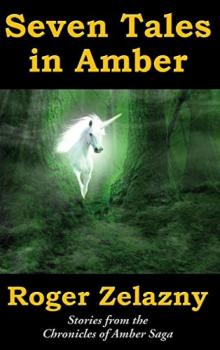 Seven Tales in Amber
Seven Tales in Amber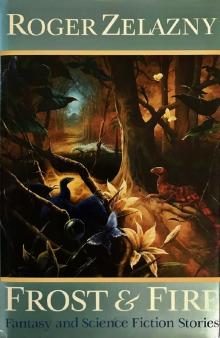 Frost and Fire
Frost and Fire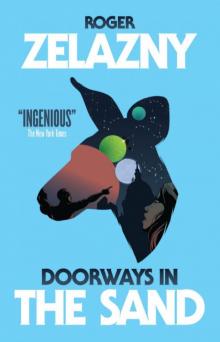 Doorways in the Sand
Doorways in the Sand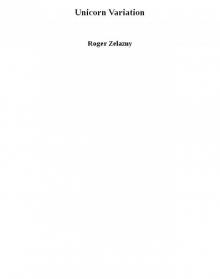 Unicorn Variation
Unicorn Variation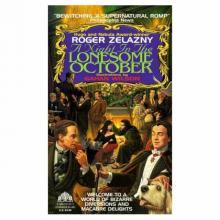 A Night in the Lonesome October
A Night in the Lonesome October Madwand
Madwand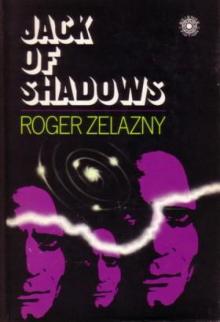 Jack Of Shadows
Jack Of Shadows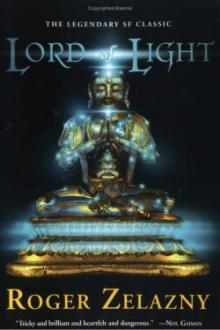 Lord of Light
Lord of Light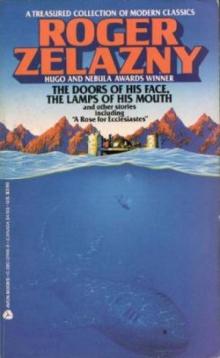 The Doors of His Face, The Lamps of His Mouth and Other Stories
The Doors of His Face, The Lamps of His Mouth and Other Stories Guns Of Avalon tcoa-2
Guns Of Avalon tcoa-2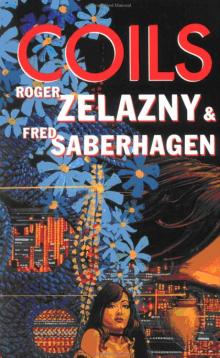 Coils
Coils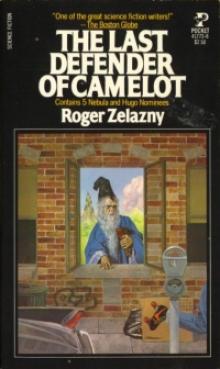 The Last Defender Of Camelot
The Last Defender Of Camelot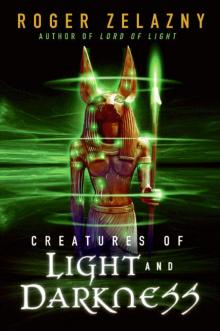 Creatures of Light and Darkness
Creatures of Light and Darkness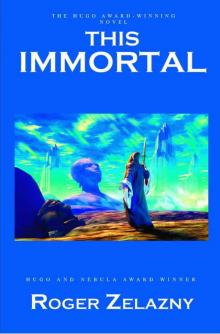 This Immortal
This Immortal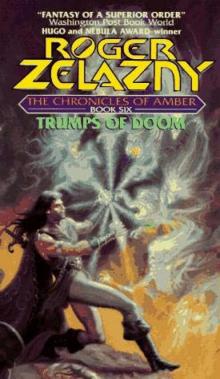 Trumps of doom tcoa-6
Trumps of doom tcoa-6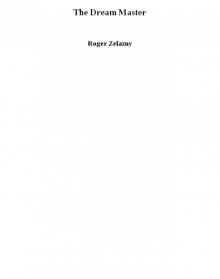 The Dream Master
The Dream Master The Complete Dilvish, The Damned
The Complete Dilvish, The Damned Nine Princes in Amber
Nine Princes in Amber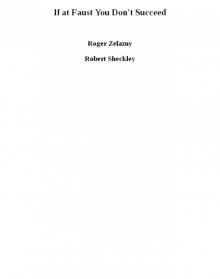 If at Faust You Don't Succeed
If at Faust You Don't Succeed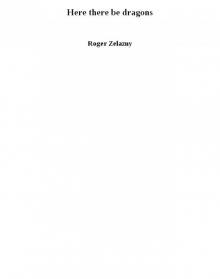 Here there be dragons
Here there be dragons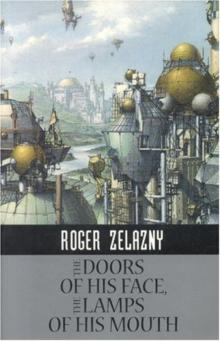 The Doors Of His Face, The Lamps Of His Mouth
The Doors Of His Face, The Lamps Of His Mouth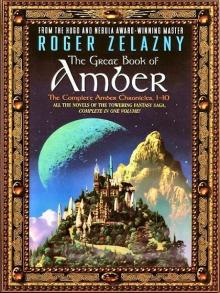 The Great Book of Amber - Chronicles 1-10
The Great Book of Amber - Chronicles 1-10 Madwand (Illustrated)
Madwand (Illustrated)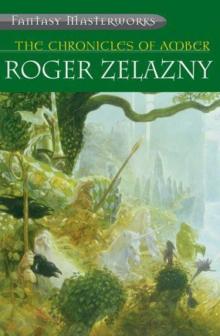 The Chronicles of Amber
The Chronicles of Amber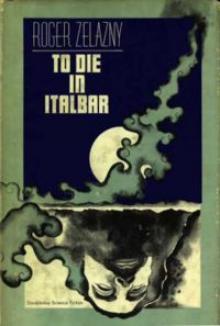 To Die In Italbar
To Die In Italbar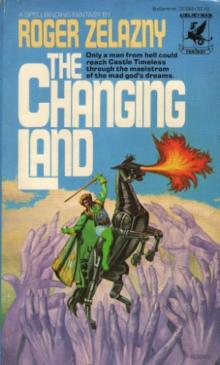 The Changing Land
The Changing Land The Furies
The Furies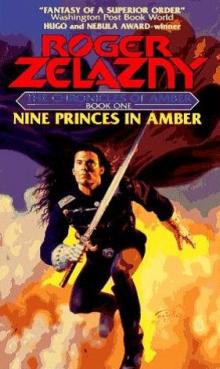 Nine Princes In Amber tcoa-1
Nine Princes In Amber tcoa-1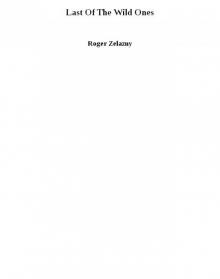 Last Of The Wild Ones
Last Of The Wild Ones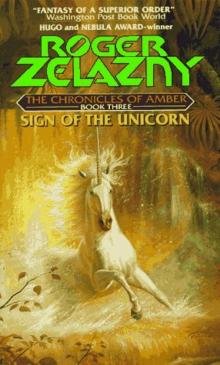 Sign of the Unicorn tcoa-3
Sign of the Unicorn tcoa-3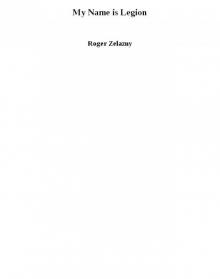 My Name is Legion
My Name is Legion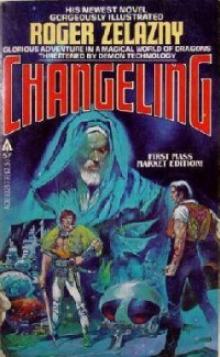 Wizard World 1: Changeling
Wizard World 1: Changeling Changeling
Changeling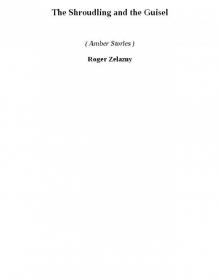 The Shroudling and the Guisel (amber stories)
The Shroudling and the Guisel (amber stories) The Mask of Loki
The Mask of Loki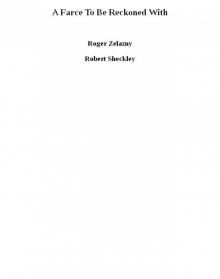 A Farce To Be Reckoned With
A Farce To Be Reckoned With Roadmarks
Roadmarks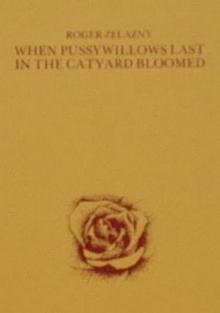 When Pussywillows Last in the Catyard Bloomed (rtf)
When Pussywillows Last in the Catyard Bloomed (rtf)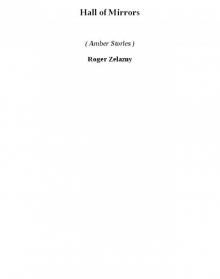 Hall of Mirrors (amber stories)
Hall of Mirrors (amber stories)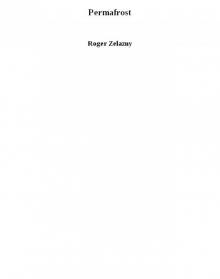 Permafrost
Permafrost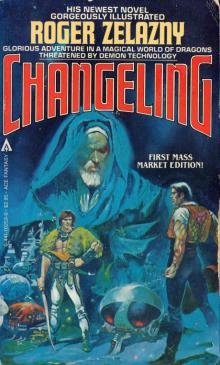 Changeling (Illustrated)
Changeling (Illustrated)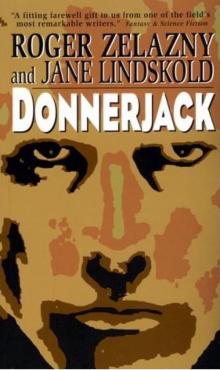 Donnerjack
Donnerjack Shadows & Reflections: A Roger Zelazny Tribute Anthology
Shadows & Reflections: A Roger Zelazny Tribute Anthology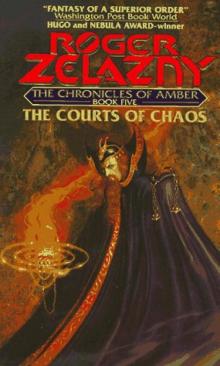 The Courts Of Chaos tcoa-5
The Courts Of Chaos tcoa-5 Flare
Flare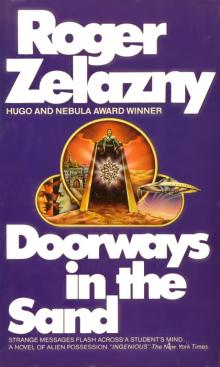 Doorsways in the Sand
Doorsways in the Sand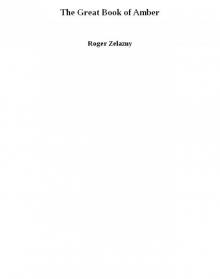 The Great Book of Amber
The Great Book of Amber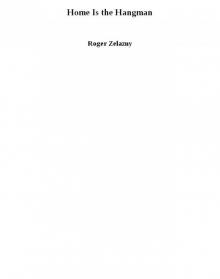 Home Is the Hangman
Home Is the Hangman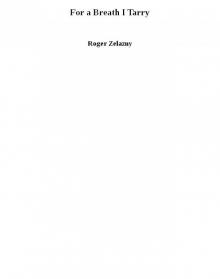 For a Breath I Tarry
For a Breath I Tarry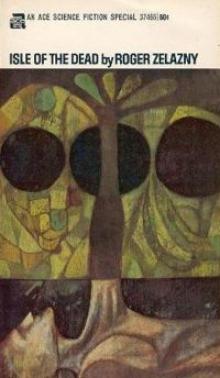 Isle Of The Dead
Isle Of The Dead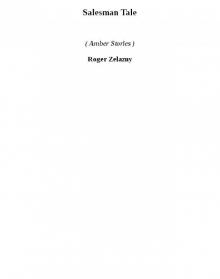 Salesman Tale (amber stories)
Salesman Tale (amber stories)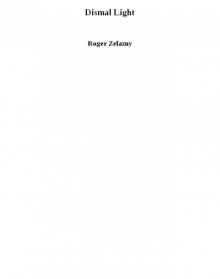 Dismal Light
Dismal Light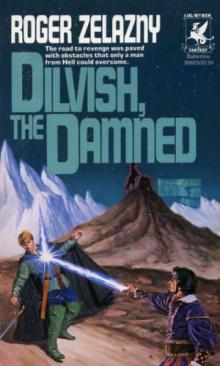 Dilvish, The Damned
Dilvish, The Damned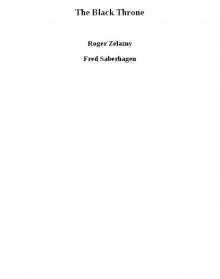 The Black Throne
The Black Throne Wizard World 2: Madwand
Wizard World 2: Madwand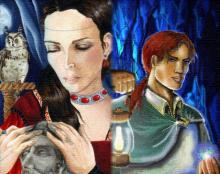 The Salesman's Tale
The Salesman's Tale